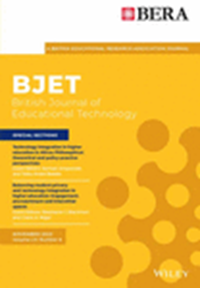Exploring homeplace as a nexus of learning and socially reproductive labour: A feminist perspective on internationalisation at a distance
Abstract
This paper explores the concept of homeplace, examining how it serves as a nexus for learning, reproductive labour, and internationalisation while problematising the gendered and depoliticised nature of international distance education. Drawing on 60 interviews with international distance students at a South African university, the research employs Black and critical feminist perspectives to critique how the blurred boundaries between private and public spheres shape learning experiences. It addresses a gap in the international distance education literature by highlighting the insufficient consideration of the social reproduction responsibilities played out in homeplaces. Our findings reveal that homeplace is neither a gender-neutral nor an idealised study environment. Instead, it leads to unequal participation in learning spaces and internationalisation efforts. Digital platforms, crucial for connectivity and collaboration in international education at a distance, also perpetuate gendered power dynamics that marginalise women's voices and contributions, but women, however, reach out and support each other in these online spaces. The research teases out the tensions between homeplace as a site for learning, living, and social reproduction, emphasising the need for international distance education institutions to address the gendered dynamics in their design and delivery that disproportionately burden those with responsibilities for social reproduction.
Practitioner notes
What is already known about this topic
- International distance education focuses on distance education provided internationally.
- Internationalisation at a Distance (IaD) activities aim to reach a broader audience beyond local students, leveraging online and blended learning models.
- IaD activities depend on the home as one of the main spaces of study while seeing online platforms as the main point of internationalisation.
- Thus far, the literature on IaD has not undertaken a critical feminist analysis or deployed Black feminist theories to explore power relations in such spaces.
What this paper adds
- Examines how the politics of the “homeplace” can be used to understand the educational experiences of international distance education students.
- Argues that current debates often overlook how the homeplace as a gendered site influences students' international distance education journeys.
- Highlights the gendered nature of the homeplace and complexities of studying from home and online, particularly for women
- Provides a critical feminist analysis of IaD, situating and problematising the homeplace as the main site for IaD.
Implications for practice and/or policy
- Emphasises the need for institutional policies that consider the homeplace as a significant site for internationalisation at a distance.
- Recommends the development of support systems and resources to help students manage conflicting demands of home and study.
- Advocates for a more nuanced approach to distance education that addresses the diverse needs of students, including those balancing significant responsibilities like employment and family obligations.




 求助内容:
求助内容: 应助结果提醒方式:
应助结果提醒方式:


